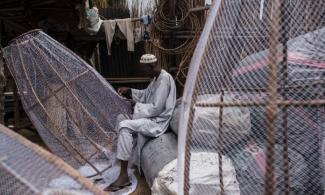
"Boko Haram lurks on the lake and when they do not kill us, they take 10,000 naira ($27, 23 euros) to allow us to fish," Aminu Mohammed, a fisherman, said.

In Nigeria’s North-East region, fishing constitutes one of the major sources of income, as Lake Chad, which borders Niger, Nigeria and Cameroon, provides a thriving source for the business.
However, following insurgency in the area, fishing is fast becoming a struggle.
Activities of the Nigerian Army targeted at curbing attacks by Boko Haram have made fishing in Lake Chad a feat for only those who dare.
According to AFP, “The fishermen of Lake Chad must sail in secret, forced to evade both Boko Haram jihadists and Nigeria's military in a desperate dance that has strangled livelihoods and caused scarcity of a once-staple food.
“While in the past, boats slid across the vast waters unhindered, sustaining a vibrant fishing industry in North-Eastern Nigeria, years of bloody Boko Haram militancy has deeply scarred the region.”
Although the region is taking on a new lease of life, following return of residents to various areas, “the fishermen have become ensnared in a fresh Nigerian Army counter-insurgency operation against the jihadists in and around the lake launched in May”.
Forty-five-year-old Aminu Mohammed told AFP that there isn’t much hope of doing serious business until the end of August when the Army’s ‘Operation Last Hold’ is scheduled to round off.
"Boko Haram lurks on the lake and when they do not kill us, they take 10,000 naira ($27, 23 euros) to allow us to fish," Mohammed told AFP.
He also stated that there are threats of arrests by the military, who “have detained fishermen in the region and accused them of financing the jihadists by paying them taxes”.
Yakubu Dangombe, one of the few fishermen, described the current situation as a “disaster”.
Dangombe, who said he has 35 children and cannot afford to cater to their needs, “had two million naira of fish stuck on the road in Baga, the main fishing hub on the Nigerian side of the lake, blocked by soldiers".
A salesman, who asked not to be named, also stated that “to avoid the military, traders smuggle the fish into Maiduguri by road in bundles of 10 or 30 kilograms stashed in cars and ‘under travellers' suitcases.'”
Two years after the reopening of Baga market, traders are accusing soldiers of seizing stocks of fish transported by road, as well as collecting taxes, which, for officials of the fish sellers association, justifies the high cost of fish.
"People would like everything to be like before, but it's not so simple; you have to pay armed escorts on the road, because the situation is volatile," Mallam Baba Musa, the secretary of the Fish Producers and Marketers Association of Borno State, was quoated as saying.
However, Dangombe insisted that "whether it's the military or Boko Haram, we are stuck between a rock and a hard place".
Consequently, residents of the Borno State capital have resorted to alternative sources of protein and the reason for this is not far-fetched.
“The shortage has caused a dramatic spike in fish prices: one pile (seven or eight fish) has surged in the past three months from 4,000 to 10,000 naira," the AFp report said. "So customers have turned to other sources of protein. In a large yard where men use jerry cans to smoke tilapia and perch, there are some new additions to the menu: monitor lizards and cats.”